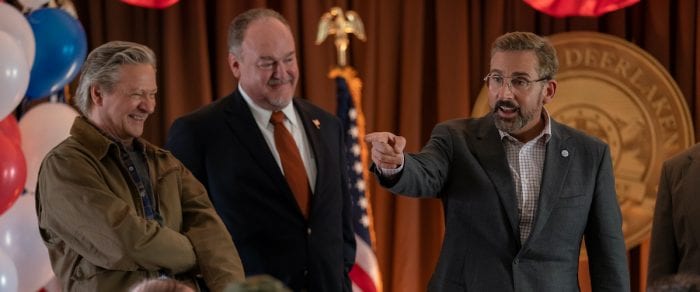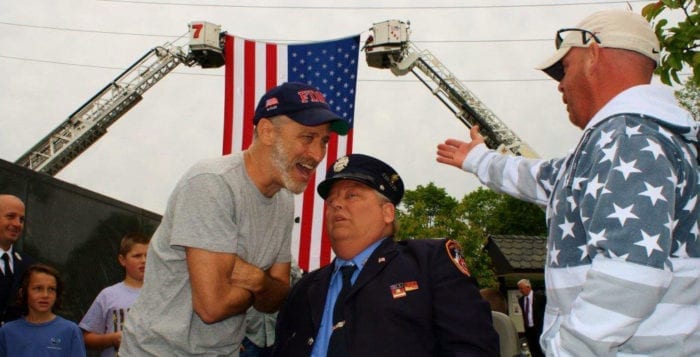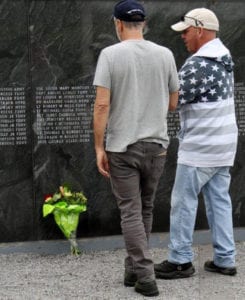Reviewed by Jeffrey Sanzel
Jon Stewart’s late-night reign on The Daily Show lasted sixteen years, from 1999 through 2015. His bold skewering of American and world events was equaled only by Stephen Colbert of The Colbert Report. Together, they dominated an outrageous corner of a unique brand of journalism.
Stewart’s first foray into writing and directing was the film adaption of the memoir Then They Came for Me, titled Rosewater (2014), a serious drama about London-based Iranian-Canadian journalist Maziar Bahari’s imprisonment in Iran. Now, Stewart has turned to comedy and written and directed the political satire Irresistible.

Steve Carell (Michael Scott of The Office, General Naird in Netflix’s Space Force, and one of Stewart’s Daily Show colleagues) plays Gary Zimmer, a Democratic political strategist working the campaign of retired Marine Colonel Jack Hastings (Chris Cooper) as he runs for mayor in a what is a unanimously conservative Wisconsin town. Hastings had interrupted a town hall meeting with a plea for their undocumented workers, making a case that everyone’s responsibility is “to the least of us.” A viral video brings Hastings’ plea to Zimmer’s attention.
Coming off the failed 2016 presidential campaign, this is Zimmer’s attempt to connect with the voters of the heartland. No sooner does he set up camp than his Republican equivalent, nemesis Faith Brewster (Rose Byrne), shows up to take over the current mayor’s (Brent Sexton) campaign. It is all-out war between the two factions as the battle is played out in the national media.
Initially, there are a good number of city-folk-in-the-country gags. Seeing the entire campaign staff crammed into a car in the high school parking lot because it’s the only place with decent Wi-Fi is amusing. One particularly obvious (but admittedly humorous) moment is the announcement of the Colonel’s campaign while Zimmer is trying to get the cows posed properly behind him. Fortunately, these easy laughs are not what make up the majority of the film. Most of the real wit comes at the expense of both the left and the right and the extremes they will go to “win,” as well as a viciously accurate look at the twenty-four hours news cycle.

The film doesn’t avoid the dire straits and financial hardships of the current Midwest. Deerlaken has been hard-hit by the closing of its military base. There are empty shops up and down the narrow main street. Its citizens are struggling. Stewart makes a point of honoring their humanity and intelligence; it is not a long stream of hick and redneck jokes but real people dealing with difficult problems. The fact that Deerlaken’s two sides don’t rise to the adversarial levels of the interlopers shows that they are, above all, a community.
A great deal is made about the age of information. Both Zimmer and Brewster bring in droves of consultants to research, conduct focus groups, and create over-the-top advertisements. One assessment that is an example of misplaced reliance on computer analysis is the disastrous leafletting campaign that ends up targeting a convent.
The character development is subtle but ever present. All of the characters either grow or reveal themselves through the fast-moving hundred minutes. And while much of the situation is both ridiculous and untenable — and is as extreme as it gets — the reality is never gone. The campaign gets uglier, and Zimmer loses sight of his original goal. There is a comic discussion of “they go low; we go high” as he travels further down the twisted road in the opposite direction. This speaks to the overall question of what it means to be a good guy vs. “a good guy.”
One of the main takeaways is that elections are not even about politics. They are about math. If you can’t get more people to vote for your candidate, then you get fewer people to vote for the other. This is one of the few films to deal directly with the what is labeled the “election economy” — the money that is made through the campaigns but not necessarily for them. Fortunately, for a film about a corrupt and awful system, it never loses its comedic center.
The cast is all in top form. Carell gives a nuanced performance, with the growing realty that he is an outsider and yet believes in what he is doing. One of his most effective moments is when he explains the difference in the two factions; this gleam of non-partisan passion is beautifully understated. Byrne is a bit of evil incarnate but still manages to be wickedly charismatic. Chris Cooper accomplishes in silence what most actors can barely achieve with dialogue. When Zimmer drags him to New York for a West Side fundraiser, the pain and embarrassment are only matched by the pride in his own beliefs.
Mackenzie Davis (recently seen in The Turning) has just the right mix of ease and strength as the Colonel’s daughter, who is wary of the entire process, and whose only concern is for her widowed father. Sexton’s mayor shows that he loves his people and is as frustrated with the situation as the Colonel. The supporting cast are all uniformly good, with the actors playing the locals being particularly dimensional and avoiding caricature.
The film’s final shift is a smart-one and an incredible “ah-hah” moment — one that resonates in ways that will keep you thinking for quite some time. It raises very serious questions about the structure and value of the United States’ election process. And make sure to watch through the cunningly clever credits as well as the exit interview Jon Stewart conducts with Trevor Potter, former chairman of the Federal Election Commission. Though light in tone, its message is clear and drives home the questions raised in the film’s final act.
In short, Irresistible is very entertaining, with a big heart but an even bigger brain. You can watch it for the laughs but you will leave it with an education. Rated R, the film is now available On Demand.
Photos courtesy of Focus Features







